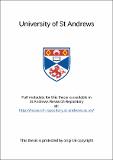Health carers' and young people's conceptualisations of chronic illness : an anthropological interpretation of 'Diabetes mellitus'
Abstract
Young people with Insulin-Dependent Diabetes Mellitus (IDDM) in Scotland must learn, together with the support of professional health carers, to take responsibility, on a daily basis, for the rigorous control of diabetes in an effort to reduce the instances of long-term complications which result in severe disability and early death in the second, third and fourth decades of life. Medical research shows that diabetes management is poorest during adolescence, with health carers identifying this group as the most challenging to look after. A great deal of quantitative scientific work has been done to explore the biomedical circumstances of the disease in this age group in an effort to improve management control. However, there appears to have been little qualitative and ethnographic research on young people with diabetes in the United Kingdom. Recently, the impact of social and cultural influences on young diabetics' situations and their concordance with management has been acknowledged. I was invited to join multidisciplinary health care teams in Scotland in an effort to introduce health carers to social science perspectives and to provide some social and cultural background relating to young peoples' situations. The present study is an anthropological interpretation of relationships between young people with diabetes, aged between thirteen and twenty-five years, and professional health carers. It compares young peoples' and health carers' experiences of diabetes, together with their beliefs and expectations about the appropriate amount of support that this age group requires in coping with this chronic condition. The analytical framework of this research engages with medical anthropology and a critique of its, and social sciences', relationship with biomedicine. In particular, it focuses on medical anthropology's use of oppositional models, such as the conversion model of health care and the medicalisation critique, to analyse patient-carer interactions. Alternative, non-oppositional, models are more appropriate to diabetes ethnography, where patient-carer interdependence to overcome the difficulties of diabetes management is the central theme. The thesis also argues that there should be recognition of the equally important interdependence between medical anthropology and biomedicine - this should go some way towards bridging the differences between these contrasting disciplinary perspectives.
Type
Thesis, PhD Doctor of Philosopy
Collections
Items in the St Andrews Research Repository are protected by copyright, with all rights reserved, unless otherwise indicated.

